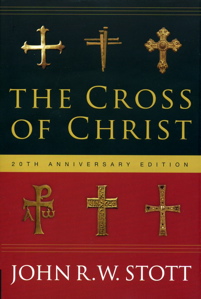This time of year is a great opportunity to reflect on Jesus’ death and resurrection. Here are some insights gleaned from John Stott’s The Cross Of Christ:
“In the Christian theology of history, the death of Christ is the central point of history; here all the roads of the past converge; hence all the roads of the future diverge.” (Stephen Neill, page 49)
‘The cross of Christ “is the event in which God makes known his holiness and his love simultaneously, in one event, in an absolute manner.'” (Emil Brunner, page 131)
Defining the substitutionary atonement
“God, because in his mercy he willed to forgive sinful men, and being truly merciful, willed to forgive them righteously, that is, without in any way condoning their sin, purposed to direct against his own very self in the person of his Son the full weight of that righteous wrath which they deserved.” (Charles Cranfield, page 134)
“In Pauline thought, man is alienated from God by sin and God is alienated from man by wrath. It is in the substitutionary death of Christ that sin is overcome and wrath averted, so that God can look on man without displeasure and man can look on God without fear.” (David Wells, page 173)
‘No verse specifically declares that “God himself” died on the cross… The reasons for this are not difficult to find. First, immortality belongs to God’s essential being… So he became man in order to be able to do so… The second reason… is that “God” in the New Testament frequently means “the Father” and the person who died on the cross was not the Father but the Son.” (page 154)
“The biblical gospel of atonement is of God satisfying himself by substituting himself for us.” (page 159)
The offence of the cross: “All other forms of religion—not to mention philosophy—deal with the problem of guilt apart from the intervention of God, and therefore they come to a ‘cheap’ conclusion. In them man is spared the final humiliation of knowing that the Mediator must bear the punishment instead of him. To this yoke he need not submit. He is not stripped absolutely naked.” (Emil Brunner, page 162)
On liturgy: “…all progress in the Christian life depends upon a recapitulation of the original terms of one’s acceptance with God.” (page 265)
On the problem of suffering: “There is still a question mark against human suffering, but over it we boldly stamp another mark, the cross that symbolises divine suffering.” (page 327)
On witnessing: “It is the crucified man that can preach the cross.” (G. Campbell Morgan, page 341)
About Ben Kwok


Thanks for the post, Ben.
Yes. Thanks.